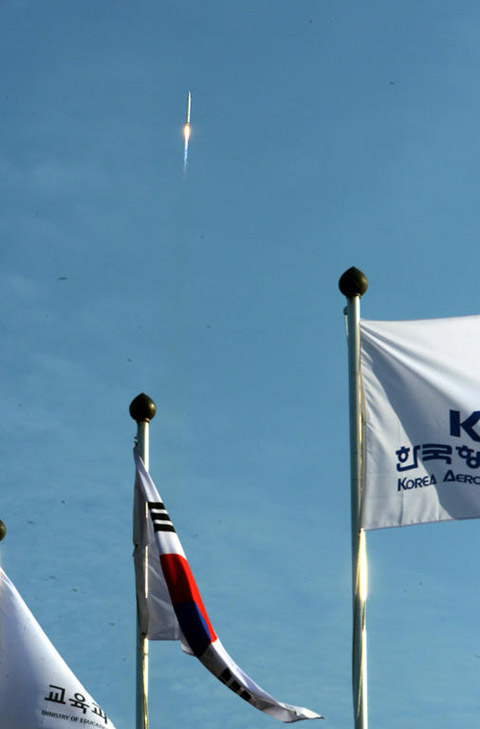★나로호의 3번째 도전과 성공/중앙일보

세계 주요 언론들은 30일 한국의 나로호 발사 소식을 긴급 뉴스로 전하며 관심을 보였다. 뉴욕타임스는 이날 “한국이 3번의 시도 끝에 인공위성을 궤도에 진입시키는 데 성공했다”고 전했다. 이어 “한국은 성공적인 우주 프로그램을 가진 중국과 일본에 뒤처졌다고 생각하며 자체 기술력을 확보하려 했다”며 “이 과제는 지난해 12월 12일 북한의 성공적인 로켓 발사로 더욱 긴급해졌다”고 분석했다. CNN은 발사 장면을 생중계하며 “한국이 2차례의 실패 끝에 나로호 발사에 성공했다”고 보도했다. BBC 방송은 발사 직후 속보로 관련 소식을 전하며 한국이 이번 발사 성공으로
‘한숨을 돌렸다(greeted with relief)’고 평했다.
▶ 원문 기사 보기 "해외언론 긴급 뉴스 보도"▶ 원문 기사 보기 "스페이스클럽, 북한 이어 세계 11번째?"▶ 원문 기사 보기 "쏴올린 국산 과학위성 임무는 우주방사선·이온층 측정"
★South Korea launches space rocket carrying satellite
The BBC's Lucy Williamson says the launch will be met with relief in Seoul
South Korea says its third attempt at launching a rocket to put a satellite in space has been a success.
The Korea Space Launch Vehicle-1 (KSLV-1) blasted off from the Naro Space Center at 16:00 (07:00 GMT).
Science Minister Lee Ju-ho said the satellite, which will collect climate data, was in its correct orbit.
The launch comes weeks after North Korea used its own three-stage rocket to place a satellite into orbit, sparking international criticism.
South Korea's 140-tonne rocket, known as Naro, was built in partnership with Russia, which had agreed to work with Seoul for three launch attempts.
Continue reading the main story
“Start Quote
If the North is determined to test, there is at best a slim possibility that it can be deterred”
End Quote Dr John Swenson-Wright Chatham House
Previous launches in 2009 and 2010 failed, and this attempt had been postponed twice for technical reasons.
But officials said Wednesday's launch from the site 480km (298 miles) south of Seoul had gone as planned and that the rocket had reached its target altitude and deployed its satellite.
"After analysing various data, the Naro rocket successfully put the science satellite into designated orbit," Mr Lee told reporters. He said the satellite had detached 540 seconds after launch.
"We now have leapt up a step to become a space-power nation," he said, adding that South Korea would use this "overwhelming moment as a strong, dynamic force" to help drive an independent space programme.
North fears
The satellite, called Science and Technology Satellite-2C, is designed to collect climate data. The Yonhap news said it was expected to make contact with its ground station at 05:00 on Thursday, at which point its operators will be able to make the final judgement on whether the launch achieved its goals.
South Korea does already have satellites in space, but they were launched from other countries.
 Pressure is high on South Korea for the launch to be a success
Pressure is high on South Korea for the launch to be a success On its first attempt to carry out a launch on its own soil, in 2009, the satellite failed to detach from the rocket in orbit. In 2010, the rocket exploded seconds after take-off.
Pressure for success has increased since North Korea launched a rocket that placed a satellite in orbit on 12 December. It followed the launch by announcing plans for a "high-level nuclear test" and more long-range rocket launches.
The UN said the North Korean launch constituted a banned test of missile technology and voted to extend sanctions against Pyongyang. There have been international calls for Pyongyang not to carry out the nuclear test.







